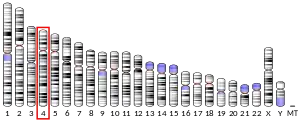40S ribosomal protein S3a
40S ribosomal protein S3a is a protein that in humans is encoded by the RPS3A gene.[3][4][5]
| RPS3A | |||||||||||||||||||||||||||||||||||||||||||||||||||
|---|---|---|---|---|---|---|---|---|---|---|---|---|---|---|---|---|---|---|---|---|---|---|---|---|---|---|---|---|---|---|---|---|---|---|---|---|---|---|---|---|---|---|---|---|---|---|---|---|---|---|---|
| |||||||||||||||||||||||||||||||||||||||||||||||||||
| Identifiers | |||||||||||||||||||||||||||||||||||||||||||||||||||
| Aliases | RPS3A, FTE1, MFTL, S3A, ribosomal protein S3A | ||||||||||||||||||||||||||||||||||||||||||||||||||
| External IDs | OMIM: 180478 HomoloGene: 133575 GeneCards: RPS3A | ||||||||||||||||||||||||||||||||||||||||||||||||||
| |||||||||||||||||||||||||||||||||||||||||||||||||||
| |||||||||||||||||||||||||||||||||||||||||||||||||||
| |||||||||||||||||||||||||||||||||||||||||||||||||||
| |||||||||||||||||||||||||||||||||||||||||||||||||||
| Wikidata | |||||||||||||||||||||||||||||||||||||||||||||||||||
| |||||||||||||||||||||||||||||||||||||||||||||||||||
Ribosomes, the organelles that catalyze protein synthesis, consist of a small 40S subunit and a large 60S subunit. Together these subunits are composed of 4 RNA species and approximately 80 structurally distinct proteins. This gene encodes a ribosomal protein that is a component of the 40S subunit. The protein belongs to the S3AE family of ribosomal proteins. It is located in the cytoplasm. Disruption of the gene encoding rat ribosomal protein S3a, also named v-fos transformation effector protein, in v-fos-transformed rat cells results in reversion of the transformed phenotype. Transcript variants utilizing alternative transcription start sites have been described. This gene is co-transcribed with the U73A and U73B small nucleolar RNA genes, which are located in its fourth and third introns, respectively. As is typical for genes encoding ribosomal proteins, there are multiple processed pseudogenes of this gene dispersed through the genome.[5]
Interactions
RPS3A has been shown to interact with DNA damage-inducible transcript 3.[6]
References
- GRCh38: Ensembl release 89: ENSG00000145425 - Ensembl, May 2017
- "Human PubMed Reference:". National Center for Biotechnology Information, U.S. National Library of Medicine.
- Nolte D, Taimor G, Kalff-Suske M, Seifart KH (July 1996). "The human S3a ribosomal protein: sequence, location and cell-free transcription of the functional gene". Gene. 169 (2): 179–85. doi:10.1016/0378-1119(95)00708-3. PMID 8647443.
- Metspalu A, Rebane A, Hoth S, Pooga M, Stahl J, Kruppa J (November 1992). "Human ribosomal protein S3a: cloning of the cDNA and primary structure of the protein". Gene. 119 (2): 313–6. doi:10.1016/0378-1119(92)90289-2. PMID 1398113.
- "Entrez Gene: RPS3A ribosomal protein S3A".
- Cui, K; Coutts M; Stahl J; Sytkowski A J (March 2000). "Novel interaction between the transcription factor CHOP (GADD153) and the ribosomal protein FTE/S3a modulates erythropoiesis". J. Biol. Chem. UNITED STATES. 275 (11): 7591–6. doi:10.1074/jbc.275.11.7591. ISSN 0021-9258. PMID 10713066.
Further reading
- Wool IG, Chan YL, Glück A (1996). "Structure and evolution of mammalian ribosomal proteins". Biochem. Cell Biol. 73 (11–12): 933–47. doi:10.1139/o95-101. PMID 8722009.
- Kato S, Sekine S, Oh SW, et al. (1995). "Construction of a human full-length cDNA bank". Gene. 150 (2): 243–50. doi:10.1016/0378-1119(94)90433-2. PMID 7821789.
- Matoba R, Okubo K, Hori N, et al. (1994). "The addition of 5'-coding information to a 3'-directed cDNA library improves analysis of gene expression". Gene. 146 (2): 199–207. doi:10.1016/0378-1119(94)90293-3. PMID 8076819.
- Vladimirov SN, Ivanov AV, Karpova GG, et al. (1996). "Characterization of the human small-ribosomal-subunit proteins by N-terminal and internal sequencing, and mass spectrometry". Eur. J. Biochem. 239 (1): 144–9. doi:10.1111/j.1432-1033.1996.0144u.x. PMID 8706699.
- Kho CJ, Wang Y, Zarbl H (1997). "Effect of decreased fte-1 gene expression on protein synthesis, cell growth, and transformation". Cell Growth Differ. 7 (9): 1157–66. PMID 8877097.
- Naora H, Takai I, Adachi M, Naora H (1998). "Altered cellular responses by varying expression of a ribosomal protein gene: sequential coordination of enhancement and suppression of ribosomal protein S3a gene expression induces apoptosis". J. Cell Biol. 141 (3): 741–53. doi:10.1083/jcb.141.3.741. PMC 2132756. PMID 9566973.
- Rebane A, Tamme R, Laan M, et al. (1998). "A novel snoRNA (U73) is encoded within the introns of the human and mouse ribosomal protein S3a genes". Gene. 210 (2): 255–63. doi:10.1016/S0378-1119(98)00070-5. PMID 9573378.
- Kenmochi N, Kawaguchi T, Rozen S, et al. (1998). "A map of 75 human ribosomal protein genes". Genome Res. 8 (5): 509–23. doi:10.1101/gr.8.5.509. PMID 9582194.
- Cui K, Coutts M, Stahl J, Sytkowski AJ (2000). "Novel interaction between the transcription factor CHOP (GADD153) and the ribosomal protein FTE/S3a modulates erythropoiesis". J. Biol. Chem. 275 (11): 7591–6. doi:10.1074/jbc.275.11.7591. PMID 10713066.
- Song D, Sakamoto S, Taniguchi T (2002). "Inhibition of poly(ADP-ribose) polymerase activity by Bcl-2 in association with the ribosomal protein S3a". Biochemistry. 41 (3): 929–34. doi:10.1021/bi015669c. PMID 11790116.
- Andersen JS, Lyon CE, Fox AH, et al. (2002). "Directed proteomic analysis of the human nucleolus". Curr. Biol. 12 (1): 1–11. doi:10.1016/S0960-9822(01)00650-9. PMID 11790298. S2CID 14132033.
- Jäkel S, Mingot JM, Schwarzmaier P, et al. (2002). "Importins fulfil a dual function as nuclear import receptors and cytoplasmic chaperones for exposed basic domains". EMBO J. 21 (3): 377–86. doi:10.1093/emboj/21.3.377. PMC 125346. PMID 11823430.
- Goodin JL, Rutherford CL (2003). "Characterization of human ribosomal S3a gene expression during adenosine 3':5' cyclic monophosphate induced neuroendocrine differentiation of LNCaP cells. Regulation of S3a gene expression in LNCaP". Mol. Biol. Rep. 29 (3): 301–16. doi:10.1023/A:1020457400377. PMID 12463423. S2CID 33271815.
- Strausberg RL, Feingold EA, Grouse LH, et al. (2003). "Generation and initial analysis of more than 15,000 full-length human and mouse cDNA sequences". Proc. Natl. Acad. Sci. U.S.A. 99 (26): 16899–903. Bibcode:2002PNAS...9916899M. doi:10.1073/pnas.242603899. PMC 139241. PMID 12477932.
- Scherer SW, Cheung J, MacDonald JR, et al. (2003). "Human chromosome 7: DNA sequence and biology". Science. 300 (5620): 767–72. Bibcode:2003Sci...300..767S. doi:10.1126/science.1083423. PMC 2882961. PMID 12690205.
- Reuter TY, Medhurst AL, Waisfisz Q, et al. (2003). "Yeast two-hybrid screens imply involvement of Fanconi anemia proteins in transcription regulation, cell signaling, oxidative metabolism, and cellular transport". Exp. Cell Res. 289 (2): 211–21. doi:10.1016/S0014-4827(03)00261-1. PMID 14499622.
- Bernhard OK, Cunningham AL, Sheil MM (2004). "Analysis of proteins copurifying with the CD4/lck complex using one-dimensional polyacrylamide gel electrophoresis and mass spectrometry: comparison with affinity-tag based protein detection and evaluation of different solubilization methods". J. Am. Soc. Mass Spectrom. 15 (4): 558–67. doi:10.1016/j.jasms.2003.12.006. PMID 15047060.

